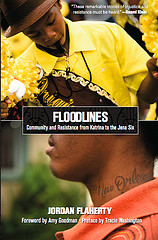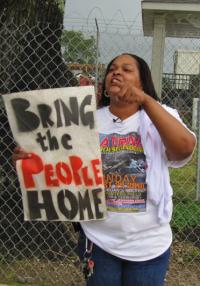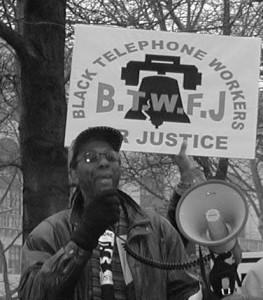 By Jordan Flaherty
By Jordan Flaherty
With an introduction by Democracy Now host Amy Goodman
And a preface by civil rights attorney Tracie Washington
What People Are Saying About Floodlines:

 By Jordan Flaherty
By Jordan Flaherty
With an introduction by Democracy Now host Amy Goodman
And a preface by civil rights attorney Tracie Washington
What People Are Saying About Floodlines:
The Malcolm X Grass roots Movement (MXGM) is an organization of people of Afrikan descent in the United States who believe in fighting for and supporting self-determination and human rights for Afrikans in the United States and around the world. Our organization annually takes an international trip to build solidarity with other people struggling for liberation and social justice. This year, we come in solidarity to Haiti (with the people of Haiti).
Our objective was to meet with Haitian people and popular organizations and assess the cur rent situation in the camps and through out the country seven months after the earthquake.
What we have found is appalling. There is a lack of security, deteriorating health conditions, and inadequate access to food, water, med i cine and education in the camps. We are particularly concerned about the lack of safety and the large number of reported rapes and violent attacks on Haitian women and children in the camps.
Numerous Haitian people living in the camps have reported that aid groups and Non-Governmental Organization’s (NGO) have provided inadequate aid after millions were collected by the U.S. government (through the Clinton/ Bush initiative), the Red Cross, the United Nations and a multitude of NGOs.
We demand that the US and Haitian governments, and so-called aid organizations, be held account able and immediately collaborate with the popular organizations of Haiti for the distribution of much needed relief to Internally Displaced Haitians.
All the people we encountered in the camps and the popular movement continuously raised concerns not only about the deplorable health conditions and lack of long term planning but also the need for free and fair elections in Haiti that include lifing the ban of Fanmi Lavalas from the upcoming elections, creating a legitimate electoral council and allowing the return of Jean Bertrand Aristide who the people still view as their legitimate leader.
MXGM supports the demands of the Haitian people and popular movement. The current situation is untenable and is a violation of the principles of democracy and human rights.
MXGM opposes the banishment of Dr. Jean Bertrand Aristide from his home land and sup ports the con sis tent popular demand of the Haitian people for his speedy return. We oppose the occupation of Haiti by the United Nations and call for the freedom of Haitian political prisoners. And we sup port the demand for France and the U.S. to pay restitution and reparations to Haiti for slavery and centuries of coercion, and economic exploitation.
We will organize our communities in United States to help end the conditions we witnessed and to build the new Haiti envisioned by the people’s popular movement.
###
Thurs day, August 26, 2010
Con tact: Kamau Franklin
+001 917 53 53 041
www.mxgm.org
kamauf@mxgm.org
Dec la ra tion du Mou ve mente Pop u laire de Mal com X sur les Con di tions en Haiti
Sept Mois Après le Trem ble ment de Terre.
Le Mou ve ment Pop u laire de Mal colm X (MXGM) est une orga ni za tion des peu ples descen dus de l’Afrique aux Etats Unis qui sou tient l’auto-détermination et des droits humains pour des “Afrikans” aux Etats-Unis et mon di ale. Chaque année, notre orga ni za tion voy age à l’etranger pour aug menter la sol i dar ité avec autres com mu nautes qui lut tent pour la lib er a tion et la jus tice sociale. Cette année, nous sommes venues en sol idar ité avec les Haitiens.
Le but de notre séjour ici était a faire la con nais sance des peu ples hai tiens et des orga ni za tions com mu nautaires, et à éval uer la sit u a tion actuelle aux camps et partout sept mois après le trem ble ment de terre.
Ce qu’on a trouvé nous étonne. Aux camps, il y a un manque de secu rité, des con di tions de santé publique dégen eré, et l’acces insuff isant à la nour ri t ure, de l’eau, des medica ments, et d’education. Nous nous occupons en par ti c ulière du manque de secu rité et les nom breux actes de viol et autres formes de vio lence souf fert par des femmes et enfants hai tiens dans les camps.
Plusieurs habi tants des camps nous expliquent que, mal gré des mil lions des dol laires qu’on a ramassé du gou vern ment des Etats-Unis (grace aux fonds de Clin ton et Bush), le Croix Rouge, les Nations-Unies, et nom breux ONGs, l’aide reçu aux camps ne suf fit pas.
Nous insis tons que les gov ern ments des Etats-Unis et d’Haiti, et les organ i sa tions qui s’appellent des “organ i sa tions de l’aide,” soient rédev able et coopérer immé di ate ment avec des organ i sa tions pop u laires en Haiti à coordiner la dis tri b u tion de l’aide essen tielle aux hai tiens déplacés.
Tous les gens qu’on a ren con tré aux camps et dans les organ i sa tions pop u laires nous ont dit qu’il faut améliorer les con di tions affreuses con cer nant la santé publique et aussi le manque de plan i fi ca tion à long terme – mais aussi, on a besoin des elec tions juste en Haiti: l’enlevement de l’interdiction con tre Fanmi Lavalas, la créa tion d’une con seil elec torale légitime, et l’acceuil de Jean Bertrand Aris tide, qui les peu ples tien nent tou jours comme leur chef légitime.
MXGM sou tient les deman des du peu ple hai tien et les mou ve ments pop u laires. La sit u a tion actuelle ne peut pas con tin uer; c’est une vio la tion des principes de la democ ra cie et aussi des droits humains.
MXGM s’oppose du ban nisse ment de Dr. Jean Bertrand Aris tide de son proper pays; nous soutenons le demand con stant des peu ples hai tiens de son retour imme di ate. Nous nous opposons l’occupation d’Haiti par les Nations-Unies; nous deman dons la libéra tion de tous les pris on niers poli tiques d’Haiti. En plus, nous soutenons le demande que France et des Etats-Unis paient la resti tu tion à Haiti pour des siè cles d’escalavage, con trainte, et l’exploitation économique.
Nous déclencherons nos com mu nautés aux États-Unis à aider un nou velle Haiti, comme imag iné par des mou ve ments populaires.
###
After 400 years in the shadows of slavery…..
75 years of invisibility and exclusion under US labor law…..
6 years of a hard-fought struggle in the New York State legislature…..
Domestic workers are finally gaining rights, respect, and recognition.
On Tuesday morning September 31, 2010, domestic workers in New York State made history. Under the leadership of Domestic Workers United, the mainly People of Color and women organization waged a determined campaign to get this historic piece of legislation passed. They were certainly aware that their exclusion from the protections of the National Labor Relations Act was due to the fact that their sector of the workforce was, as it is now, almost entirely Black and Brown people in 1935 when the legislation was passed. In this sense, they have made things right for the hundreds of thousands of women and some men who have suffered at the hands of callous employers and racist lawmakers who cared nothing about their well being.
Among other provisions, this bill provides for:
Domestic workers are at the forefront of the Excluded Workers movement which emerged out of the Excluded Workers Congress held at the US Social Forum in Detroit in June of this year. This grouping includes agricultural workers, taxi drivers, immigrant workers, day laborers, ex-offenders and Southern workers. The broad sector is also mainly people of color located in increasingly important areas of the economic which place them in a strategic position and makes them a key factor in the fledgling trade union movement.
Governor Paterson signed the bill as people cried and cheered as they viewed the ceremony.
Work of the Excluded Workers Congress will continue in the Southern Region when workers and activists gather for the Southern Human Rights Organizing Committee (SHROC VIII) in Birmingham, Alabama starting on December 10.
 As we reached the 5th anniversary of the man made disaster that Katrina became, there have been two narratives about what the state of things are in New Orleans and the Gulf. The lives and conditions of Black people get some attention in the main story being told but this is overshadowed by the main story. Much of it commemorates the tragedy, the loss of lives and the epic nature of the event and aftermath. It then goes on to highlight the tremendous progress that has been made in bringing the City back to a level that tourism is booming again.
As we reached the 5th anniversary of the man made disaster that Katrina became, there have been two narratives about what the state of things are in New Orleans and the Gulf. The lives and conditions of Black people get some attention in the main story being told but this is overshadowed by the main story. Much of it commemorates the tragedy, the loss of lives and the epic nature of the event and aftermath. It then goes on to highlight the tremendous progress that has been made in bringing the City back to a level that tourism is booming again.
Music is back, there are more restaurants, the Saints won the Superbowl. Yet there remain 100,000 New Orleanians spread across the country but cannot come back because there is not enough affordable housing, schools, health care and more, to meet their needs if they came back to their beloved city. Journalist Jordan Flaherty, author of “Floodlines” has laid out what the state of things really is as seen through the eyes of a Black spoken word artist. The Institute for Southern Studies reports that while community action has flourished, the President and the Congress have yet to deliver on the promises made by the Bush Administration and have not created a disaster and recovery policy that is adequate for protecting the area.
While CNN was rehabilitating former FEMA Director Michael Brown and President Obama was speaking to a group at Xavier University, local activists were in the streets protesting the lack of progress in providing affordable housing for thousands of low income African American residents who have not been able to return to their neighborhoods. Survivors Village went to the site of a the new Columbia Park development in the St. Bernard Community to educate the President about the corrupt nature of the property managers and how former residents are being kept out. The protestors said that “the community has been purged of poor people, turned over to Warren Buffet and his investor friends, and is being promoted as the future of public housing around the country.”
While the courageous residents and survivors in New Orleans continue their fight we can held them. Here is what Advocates for Environmental Human Rights asks us to do.
TAKE FIVE ACTIONS FOR CHANGE
 On August 22, 2010 Ron “Slim” Washington, surrounded by his family with Miles Davis’ Kind of Blue playing, made his transition to join the ancestors. His death was a tremendous loss to the workers movement and the Black freedom struggle. While not well known to the mainstream media and civil rights movement, Slim was an important figure in the Black Student Movement of the early 1970’s, the African Liberation Support Committee and numerous struggles in the New York/New Jersey area.
On August 22, 2010 Ron “Slim” Washington, surrounded by his family with Miles Davis’ Kind of Blue playing, made his transition to join the ancestors. His death was a tremendous loss to the workers movement and the Black freedom struggle. While not well known to the mainstream media and civil rights movement, Slim was an important figure in the Black Student Movement of the early 1970’s, the African Liberation Support Committee and numerous struggles in the New York/New Jersey area.
Black Workers Take the Lead – For Brother Slim
(Statement presented by Saladin Muhammad)
Slim, as many here and around the country fondly called him; was a dedicated working class revolutionary and African American Freedom Fighter. If I fail to make this point clear, I have no doubts, that Slim will be organizing the other ancestors to call me a revisionist. Slim knew, felt and promoted the power of the working class. He understood and projected in his work and writings, the importance of the centrality of organized Black workers to developing the power, consciousness and vision for revolutionary change of the African American people, and wider US and international working class.
Slim understood that the struggle for African American self-determination was critical to shaping not only the national consciousness of the African American people, but also to shaping the class consciousness of the Black worker outlook about internationalism, and the need to build unity with the struggles of other oppressed peoples and nations. Slim was a founding and leading member of the National Black Workers Organizing Committee and the Black Workers Unity Movement, two efforts to build, further develop and promote the centrality of Black workers as a conscious trend in the African American people’s and workers movement. As part of Slim’s work in promoting this trend, he wrote a trend document called the Ten Task of the Conscious Black Worker. Slim understood that correct ideas have to be confirmed by practice.
His organizing of the Black Telephone Workers for Justice, a sister organization of Black Workers For Justice in North Carolina, brought new and young Black workers to activism within the trade union movement, and to levels of political consciousness that we need today, to carry out an organized challenge to the intensifying and racist attacks on the conditions of life for oppressed and working people.
Black Workers Take the Lead!; Black Workers Take the Lead!; Black Workers Take the Lead!: was Slim’s mantra. It also shaped his character, intellect and enthusiasm about jazz music. Slim’s drive to organize and promote the historical influence of Jazz as a genre representing the centrality of the Black working class, expressing the pain, suffering and struggles of the African American people, left its powerful mark in this New Jersey area. Today, as some Black activists are uniting to launch a national effort to engage the Black masses in developing a Black Manifesto Against Racism and for Human Rights, as a manifesto of national resistance, we will greatly miss your presence and leadership. However, we will always remember and be guided by your mantra – Black Workers Take the Lead!
Black Workers For Justice
August 28, 2010